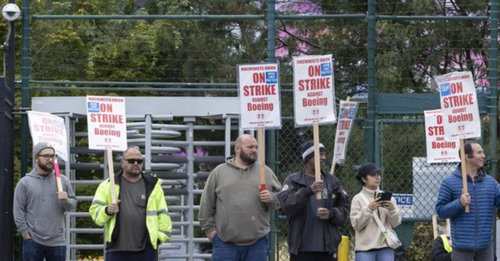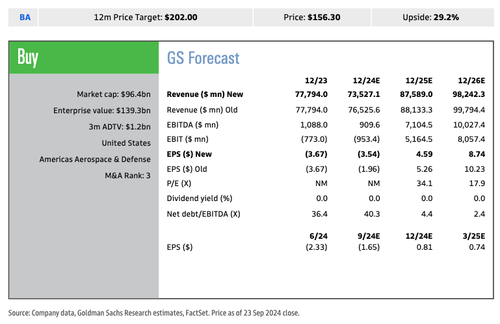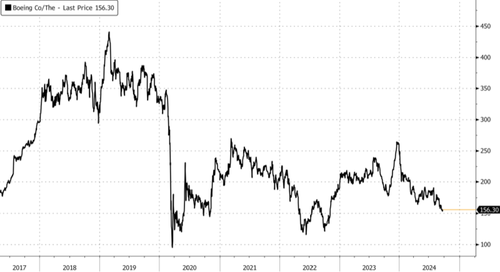
Boeing made a "best and final offer" to tens of thousands of striking International Association of Machinists and Aerospace Workers (IAM) for a renewed contract. However, IAM rejected the proposal, stating it fell short of members' demands.
According to Boeing's letter to IAM, the new contract would bump general pay by 30% over four years, reinstate the performance bonus, enhance retirement benefits, and double the ratification bonus to $6,000. Boeing stated that all other terms of the Tentative Agreement remain the same, and the new offer is contingent on ratification by the end of the week.
The new offer already appears dead in the water after IAM District 751 said it would not hold a new vote on it. This is also the second time the union has rejected an offer, the first being a 25% pay increase earlier this month.
"Logistically, we don't have the ability to set up a vote for 33,000 people in a few days like that anyway. Plus, it missed the mark on many of the things our members said were important to them," said IAM District 751 President Jon Holden. He is also the lead negotiator on the Boeing contract.
Holden told Reuters in an interview that the union "is not obligated to vote (on) their offer. We may, down the road. But our hope is that we can get into some discussion so we can actually address the need of our members." He noted the new offer did not meet all demands around retirement, wages and other critical issues.
On Sept. 13, about 32,000 IAM workers walked off the production lines of commercial jet plants across Portland and Seattle. This was the union's first major strike since 2008. The union seeks to increase pay by 40% over four years.
Multiple credit rating agencies recently warned that a prolonged strike could threaten Boeing's prized investment-grade credit rating and reduce it to junk status.
The two-week strike is set to pressure Boeing's massive supplier network, as it reduces spending to preserve cash piles. This could be a troubling sign that executives at the struggling planemaker forecast the strike might last at least a month, if not longer.
Goldman analysts Noah Poponak and Anthony Valentini told clients:
IAM workers at Boeing are on strike, though we expect a resolution soon, and for Boeing to be able to pick back up its aircraft production and delivery momentum. Deliveries the last few months have improved and September was tracking quite strong before the strike. The company faces a balance sheet question, and has suggested raising capital is possible given the importance of the credit rating. We assume Boeing raises $12bn of equity before year-end, which matches the total maturities due in 2025 + 2026, and keeps the cash balance well north of $10bn in the near-to-medium-term while they ramp back up commercial deliveries and strive to resolve defense profitability. Management provided a recent intra-quarter conference update suggesting defense in 3Q24 would have losses similar to 2Q24, and recently made leadership changes in the segment. While BA continues to face several challenges to work through near-term, we see attractive valuation relative to long-term fundamentals and are Buy rated on the stock.
The analysts noted their 'Buy' rating on Boeing.
How attractive is the current valuation considering the ongoing strike, potential credit rating downgrade, possible capital raise, and other challenges?
The Boeing strike at its main jet plants is being closely monitored by White House officials and Wall Street as the US presidential elections in November near.
Boeing made a “best and final offer” to tens of thousands of striking International Association of Machinists and Aerospace Workers (IAM) for a renewed contract. However, IAM rejected the proposal, stating it fell short of members’ demands.
According to Boeing’s letter to IAM, the new contract would bump general pay by 30% over four years, reinstate the performance bonus, enhance retirement benefits, and double the ratification bonus to $6,000. Boeing stated that all other terms of the Tentative Agreement remain the same, and the new offer is contingent on ratification by the end of the week.
The new offer already appears dead in the water after IAM District 751 said it would not hold a new vote on it. This is also the second time the union has rejected an offer, the first being a 25% pay increase earlier this month.
“Logistically, we don’t have the ability to set up a vote for 33,000 people in a few days like that anyway. Plus, it missed the mark on many of the things our members said were important to them,” said IAM District 751 President Jon Holden. He is also the lead negotiator on the Boeing contract.
Holden told Reuters in an interview that the union “is not obligated to vote (on) their offer. We may, down the road. But our hope is that we can get into some discussion so we can actually address the need of our members.” He noted the new offer did not meet all demands around retirement, wages and other critical issues.
On Sept. 13, about 32,000 IAM workers walked off the production lines of commercial jet plants across Portland and Seattle. This was the union’s first major strike since 2008. The union seeks to increase pay by 40% over four years.
Multiple credit rating agencies recently warned that a prolonged strike could threaten Boeing’s prized investment-grade credit rating and reduce it to junk status.
The two-week strike is set to pressure Boeing’s massive supplier network, as it reduces spending to preserve cash piles. This could be a troubling sign that executives at the struggling planemaker forecast the strike might last at least a month, if not longer.
Goldman analysts Noah Poponak and Anthony Valentini told clients:
IAM workers at Boeing are on strike, though we expect a resolution soon, and for Boeing to be able to pick back up its aircraft production and delivery momentum. Deliveries the last few months have improved and September was tracking quite strong before the strike. The company faces a balance sheet question, and has suggested raising capital is possible given the importance of the credit rating. We assume Boeing raises $12bn of equity before year-end, which matches the total maturities due in 2025 + 2026, and keeps the cash balance well north of $10bn in the near-to-medium-term while they ramp back up commercial deliveries and strive to resolve defense profitability. Management provided a recent intra-quarter conference update suggesting defense in 3Q24 would have losses similar to 2Q24, and recently made leadership changes in the segment. While BA continues to face several challenges to work through near-term, we see attractive valuation relative to long-term fundamentals and are Buy rated on the stock.
The analysts noted their ‘Buy’ rating on Boeing.
How attractive is the current valuation considering the ongoing strike, potential credit rating downgrade, possible capital raise, and other challenges?
The Boeing strike at its main jet plants is being closely monitored by White House officials and Wall Street as the US presidential elections in November near.
Loading…







